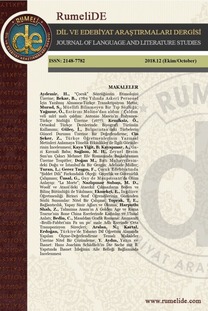ELT ideolojisini ve normalleştirilmiş söylemleri eleştirel söylem analizi yoluyla yapıbozuma uğratmak: İşbirlikçi otoetnografi
Critical pedagogy, critical discourse analysis, autoethnography, power, discourse
Deconstructing ELT ideology and normalized discourses through critical discourse analysis: Collaborative autoethnography
Critical pedagogy, critical discourse analysis, autoethnography, power, discourse,
___
- Adams T. E., Jones S. H., & Ellis C. (2015). Autoethnography: Understanding qualitative research. New York, NY: Oxford University Press.
- Bakhtin, M. M. (1981). The dialogic imagination: Four essays. Austin: University of Texas Press.
- Bochner, A. P., & Ellis, C. (2016). Evocative autoethnography: Writing lives and telling stories. New York, NY: Routledge.
- Ellis, C. (2004). The Ethnographic I: A methodological novel about autoethnography. Walnut Creek: AltaMira Press.
- Falzon, C. (1998). Foucault and social dialogue: Beyond fragmentation. London: Routledge.
- Foucault, M. (1981). Questions of method: An interview with Michel Foucault, trans. Colin Gordon. Ideology and Consciousness, 8, 3– 14.
- Freire, P. (2000). Pedagogy of the oppressed. New York, NY: Herder & Herder.
- Giroux, H., & McLaren, P. (1986). Teacher education and the politics of engagement: The case for democratic schooling. Harvard Educational Review, 56(3),213– 239.
- Giroux, H. (1988). Teachers as intellectuals. New York: Bergin & Garvey.
- Giroux, H. A. (1996). Radical pedagogy and prophetic thought: Remembering Paulo Freire. Rethinking Marxism, 9(4), 76– 87.
- Harvey, D. (2007). A brief history of neoliberalism. Oxford : Oxford University Press.
- Ignatieff, M. (2001). Human rights as politics and idolatry. Princeton, NJ: Princeton University Press.
- Jorgensen, M. W., & Phillips, L. J. (2002). Discourse analysis as theory and method. London: Sage Publications.
- Kucuradi, İ. (2013). Human rights: Concepts and problems. Munster: LIT Verlag Munster.
- McLaren, P. (2015). Pedagogy of insurrection: From resurrection to revolution. Bern, Switzerland: Peter Lang.
- Newman, S. (2001). From Bakunin to Lacan: Anti- authoritarianism and the dislocation of power. Lanham, MD: Lexington Books.
- Pennycook, A. (1998). English and the discourses of colonialism. London: Routledge.
- Pennycook, A. (2017). The cultural politics of English as an international language. London: Routledge.
- Phillipson, R. (2008). The linguistic imperialism of neoliberal empire. Critical Inquiry in Language Studies, 5(1), 1– 43.
- Phillipson, R. (2017). Myths and realities of global English. Language Policy, 16(3),313– 331.
- Said, E. (1979). Orientalism. New York : Vintage Books.
- Skutnabb- Kangas, T. (2000). Linguistic genocide in education— or worldwide diversity and human rights? Mahwah, NJ: Lawrence Erlbaum.
- Skutnabb- Kangas, T., & Phillipson, R. (2010). The global politics of language: Markets, maintenance, marginalization or murder. In N. Coupland (Ed.), The handbook of language and globalization (pp. 77– 100). Malden, MA and Oxford: Wiley- Blackwell.
- Turner, B. S. (2006). Vulnerability and human rights. University Park, PA: Penn State Press
- ISSN: 2148-7782
- Yayın Aralığı: 6
- Başlangıç: 2014
- Yayıncı: Yakup YILMAZ
Üstün bir sınıf yaratmak için öjenik bir girişim: Kazuo Ishiguro’nun Klara ile Güneş romanı
Strindberg'in Matmazel Julie oyununda hayati yalan: Yanılsamaya karşı gerçeklik
Türk epik felsefi düşüncesi ve Nizami Gencevi'nin Sırlar Hazinesi mesnevisi
Ataerkil system ve kadın: Erkeklerin ve hayaletlerin öyküleri
Wie bitte? A1.1 ders kitabının kültürlerarasılık bağlamında incelenmesi
Ana dil Türkçe konuşanların ikinci dil Rusçada görünüş bilgisini edinimi
Anastasiia SHKURENKO, Filiz CELE
Gawain-poet, literature of revelation, dream poetry, Pearl, medieval poetry
